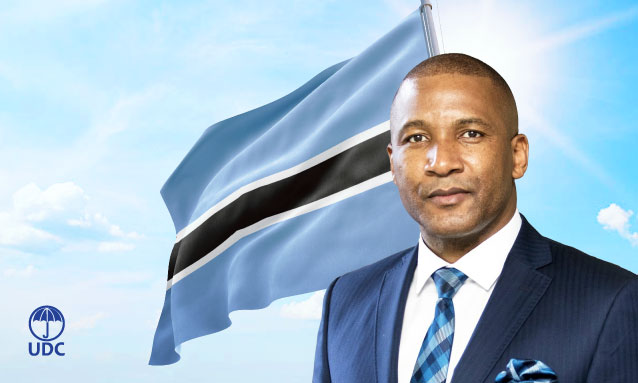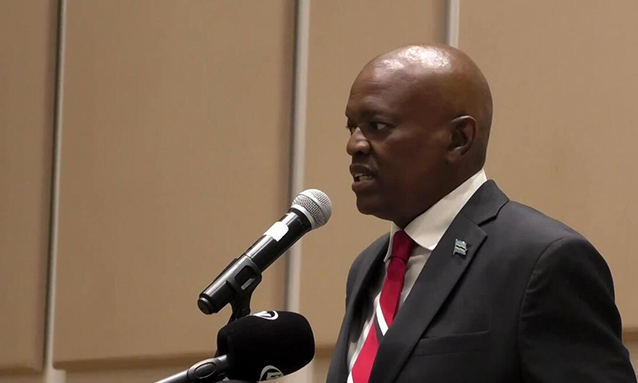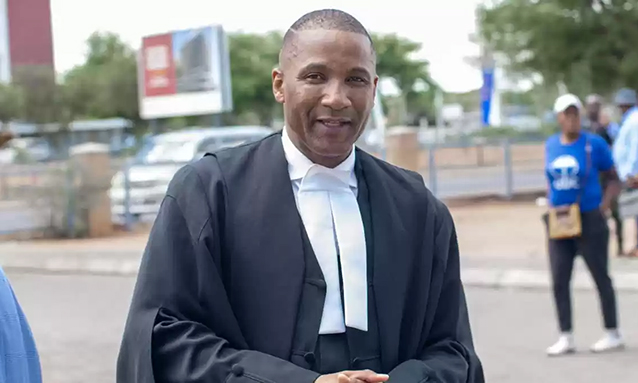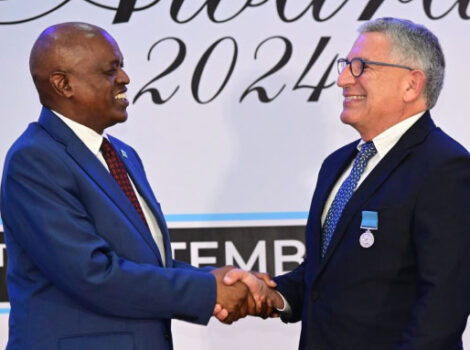
2 November 2024
Botswana’s President Mokgweetsi Masisi conceded defeat in the general election Friday, in a seismic moment of change for the country that ended the ruling party’s 58 years in power since independence from Britain in the 1960s.
Masisi’s concession came before final results were announced, with his Botswana Democratic Party trailing in fourth place in the parliamentary elections in what appeared to be a humbling rejection by voters and a landslide victory for the main opposition party.
The opposition Umbrella for Democratic Change held an overwhelming lead in the partial results, making its candidate, Duma Boko, the favourite to become president of a southern African country that is one of the world’s biggest producers of mined diamonds.
Masisi said he had called Boko to inform him he was conceding defeat and said that Boko was now effectively the president-elect. Final results were expected to be announced later Friday, but the BDP had no path to a majority.
“I concede the election,” Masisi said in an early-morning press conference two days after the vote.
“I am proud of our democratic processes. Although I wanted a second term, I will respectfully step aside and participate in a smooth transition process.”
“I look forward to attending the coming inauguration and cheering on my successor. He will enjoy my support.”

Masisi’s BDP dominated politics in Botswana for nearly six decades, since independence in 1966. The nation of just 2.3 million people will now be governed by another party for the first time in its democratic history.
The Umbrella for Democratic Change won 36 out of the 61 parliamentary seats decided by voters, according to the official count. It needs 31 to clinch a majority. The Botswana Congress Party has 15 seats, the Botswana Patriotic Front five seats, and the ruling BDP just four.
“We lost this election massively,” Masisi said.
Botswana has been held up as one of Africa’s most stable democracies and is regarded as a post-colonial success story having built one of the highest standards of living in the region through an economy that largely relies on diamonds. Botswana is the world’s second biggest natural diamond producer behind Russia and has been responsible for all the biggest diamonds found in the last decade.
But Botswana faces new challenges and the mood for change became evident as a downturn in the global demand for diamonds badly impacted the economy, becoming the central issue for the campaign.
Unemployment rose to more than 27% this year, and significantly higher for young people, as the government saw a sharp decrease in revenue from diamonds.
Masisi and his party had faced criticism for not having done enough to diversify the economy and the nation has been forced to adopt recent austerity measures.
Even the BDP conceded throughout its campaign that policy change was needed and tried to convince voters it was capable of leading the country out of its economic troubles. Diamonds account for more than 80% of Botswana’s exports and a quarter of its GDP, according to the World Bank. Masisi said the country had hardly sold any diamonds since April through its Debswana company, which the government jointly owns with diamond miner De Beers.
Botswana’s general elections decide the makeup of its Parliament, and lawmakers then choose the president. The party that gains a majority is in position to choose its candidate as president. All five of Botswana’s post-independence presidents have been from the BDP.
Boko is a 54-year-old lawyer and Harvard Law School graduate who also ran in 2014 and 2019. He posted on his official page on X: “Botswana First” with a picture of a UDC campaign poster with the words “Change is Here.”
The BDP was one of the longest-serving parties in Africa still in power and its sharp defeat came as a surprise after what was expected to be a tight race. It followed an equally momentous change in neighbouring South Africa, where the long-ruling African National Congress lost its 30-year majority in an election in May and was forced to share power for the first time in a coalition government.
Masisi, a 63-year-old former high school teacher and UNICEF employee, said he had not expected the results and had “not packed a shoe.”
Botswana’s politician who did the unthinkable

Confident and well-mannered, Botswana’s new President Duma Boko carries the traits of a highly trained human rights lawyer. The 54-year-old’s thoughtful, fluent sentences speak of his legal education first in Botswana and then at Harvard Law School in the US.
And despite being humble in victory, the fact that he won the presidency at the third time of asking reveals a single-minded ambition. For more than 50 years, opposition politicians have dreamt of unseating the mighty Botswana Democratic Party, but only Boko has made that a reality.
The crushing manner of the victory of his Umbrella for Democratic Change (UDC) party came as a surprise, including it seems to Boko himself, who admitted being shocked by the numbers. But, dressed in his signature dark blue suit, he did not gloat or celebrate wildly in his first comments to the media on Friday when the scale of his win became clear.
“I can only pledge to [the people] that I will do my very best. Where I fail and fault, I will look to them for guidance,” he said.
Boko captivated the nation going through difficult economic times with promises of change, employment and government stipends.
“People fell in love with him, and this is the result,” journalist Innocent Selatlhwa told the BBC’s Focus on Africa podcast.
Throughout his campaign, at rallies Boko would ask supporters to come closer and listen to their grievances in a way that made him appealing to young people, the journalist added. Boko was serious, but always engaging and friendly.
He also ruled out running as a member of parliament and put all his efforts into becoming president – a bold move, according to Selatlhwa.
Born in 1969, in the country’s Central District, in the small town of Mahalapye, Boko always had a sense of respect, according to relatives.
“He was so fixated with doing the right thing. His sense of justice ran deep,” his aunt told a local newspaper.
During his time in school, he was elected president of the student council. In his legal career, he emerged as one of the country’s top lawyers, according to political analyst Lesole Machacha. Passionate about knowledge and education, Boko always has a strong grasp on current affairs and issues in Botswana, Machacha told the BBC.
“He is serious about fixing the country,” he added.
He became the leader of the Botswana National Front (BNF) in 2010, which used to have more “communist ideals”, said Machacha, but the party has since tacked towards the centre. Frustrated by the years of opposition defeat, Boko pioneered the creation of an alliance of the parties opposed to the government, and the UDC was born.
He came under fire over a decade ago when he described the academic staff at the University of Botswana as “useless”, despite being a former lecturer. Many people took this as a dig at the country’s education system. When he was confronted about this by a journalist on the South African news channel eNCA he responded: “The truth hurts.”
Earlier this month, his wife Kaone Boko told the Mmegi newspaper that her husband was principled to the point of stubbornness.
“He does not back down from a fight; no matter how big the enemy is,” she said.
A clue perhaps to how he managed to stay the course and see off one of Africa’s most successful political parties.
Source: https://apnews.com/article/botswana-election-masisi-concedes-80951b62fdb7169f073c2b13acaff1b6 and https://www.bbc.com/news/articles/cx2yx5nk1l0o



